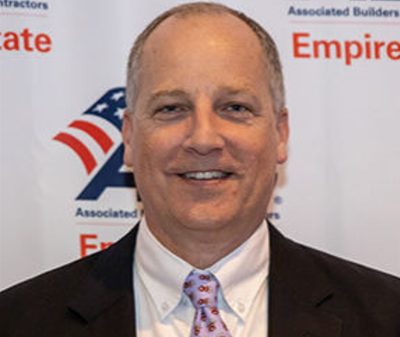
Construction Affordability is Easy to Achieve
New York’s affordability crisis didn’t just happen overnight. It was created by our so-called leaders in Albany.
Gov. Kathy Hochul and state lawmakers claim they’re working to help struggling families, but their policies tell a different story. They prioritized special interests over taxpayers, and now we’re all paying the price.
The governor’s proposals, such as small tax rebates and expanded child tax credits, won’t solve the real problem for the vast majority of New Yorkers. Instead of throwing a Band-Aid on a gaping wound, leaders in Albany must enact fundamental changes to alleviate this crisis. To accomplish this, they must lower the cost of living by cutting costs for New Yorkers, starting with construction.
At the heart of this affordability crisis are New York’s sky-high construction costs, which directly raise taxes and make basic, vital projects—like schools, hospitals, housing and renewable energy systems—far more expensive. Due to its burdensome regulations, New York ranks second to last in the nation for competitiveness and a healthy construction environment with a job growth rate of -2.1% (2024 Construction Scorecard). Meanwhile, New York City’s average construction costs hit some of the highest levels in the world.
The issue isn’t the markets; it’s the policies.
The Root of the Problem: Albany’s Costly Policies
For decades, relative to construction, Albany has been swayed by special-interest campaign contributions, leading to policies that drive up costs. The past few years have been especially egregious, from project labor agreements, or PLAs, to an expansion of prevailing wage mandates to private construction and the outdated and extremely expensive Scaffold Law. These decisions have made construction in New York the most expensive in the nation. These intentional policy decisions have inflated housing prices, driven up energy costs and burdened taxpayers.
In 2023, New York lost about 180,000 residents as people moved to more affordable states, where they can actually buy a home. It’s not the weather; they’re leaving because Albany’s policymakers have made New York unaffordable for regular people.
There are real solutions Albany can, and must, pursue if we are to make construction more affordable. These need to be addressed this legislative session.
Prevailing Wage Laws Artificially Inflate Costs
Prevailing wage laws were intended to ensure fair pay, but in New York, they’re misused. Instead of reflecting the actual local wages, the state calculates wages based on the highest union-negotiated rates, driving up construction costs by 13% to 25%, depending on the county. This system wastes billions of our taxpayer dollars annually. New York should follow the federal government and many states and base prevailing wages on average local rates, ensuring fair pay while lowering construction costs.
Project Labor Agreements Reduce Competition
PLAs are collective bargaining agreements that require contractors to hire most of their workers through the union hall—typically 3 out of every 4. While PLAs may seem appealing at first glance, about 80% of construction workers in New York are not union members, meaning they’re effectively excluded from PLA projects. If 80% of the workforce isn’t unionized, only about 20% of contractors who are signatories to a union will bid on PLA projects. That reduces competition and drives up costs for taxpayers. According to multiple studies, PLAs can increase project costs by as much as 20% due to the lack of competition in the bidding process.
While PLAs benefit union leaders, they hurt taxpayers and make it more difficult to build the affordable housing and renewable energy systems New York desperately needs. Albany must end its widespread use of PLAs.
Staged Construction Accidents
Workers’ compensation fraud due to faked or staged construction accidents is an epidemic in New York. There are thousands of cases where the workers’ compensation system has been manipulated by filing false claims to obtain a higher payout. Innocent workers, often non-English speakers, are being used as pawns by corrupt trial attorneys and for-profit medical providers who simply want to line their pockets and care nothing about ruining people and making New York more expensive.
Albany must pass legislation making the staging of fraudulent construction accidents a Class E felony.
The Scaffold Law: A Monster from the Past
New York’s workers’ compensation system is under assault, primarily due to the Scaffold Law (Labor Law 240), which dates from to the 1800s. This law holds employers, property owners and contractors absolutely liable for “gravity-related” injuries, regardless of worker negligence. New York is the only state in the nation with this law; it has been repealed in every other state due to the immense cost burden it imposes.
Studies show the law costs taxpayers over a billion dollars every year. Repealing the Scaffold Law would save billions for New Yorkers by reducing liability claims and insurance costs.
The Path Forward
Leaders in Abany need to get serious about fixing the affordability crisis. The solutions are clear: eliminate PLAs, reform prevailing wage laws to reflect actual local wages, stop the epidemic of staged construction accidents and repeal the Scaffold Law.
These steps will save billions for New Yorkers and make room for affordable housing, schools, improve our roads and bridges and make desperately needed improvements to our energy grid. Leaders must stop prioritizing special interests and start putting you first. If leaders in Albany fail to act, they will cement their legacy as the architects of New York’s decline.
New Yorkers deserve better. To our elected leaders we say this: Stop making excuses and start fixing what’s broken.
As President of Associated Builders and Contractors, Empire State Chapter, Brian Sampson is responsible for coordinating its political and policy agenda, advocating for reform in state government, and promoting the overall growth of the construction industry on behalf of ABC’s more than 400 construction and contracting firms across New York State.
*sponsored content*

